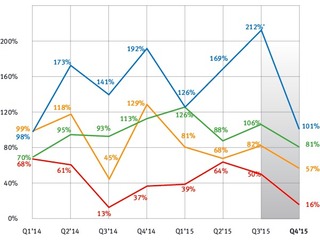Editor’s Note: Our annual Vator Splash Spring 2016 conference is around the corner on May 12, 2016 at the historic Scottish Rite Center in Oakland. Speakers include Nigel Eccles (CEO & Co-founder, FanDuel), Andy Dunn (Founder & CEO, Bonobos), Mitch Kapor (Founder, Kapor Center for Social Impact); Founders of NextDoor, Handy, TubeMogul; Investors from Khosla Ventures, Javelin Venture Partners, Kapor Capital, Greylock, DFJ, IDG, IVP and more. Join us! REGISTER HERE.
With the first quarter of 2016 coming to a close, investment research site PitchBook published a list of the five most active venture capital firms of the past three months. I thought I would dig a little deeper, presenting some of the biggest investments made by those VCs this quarter.
—————
![]() 1. Sequoia Capital (27 investments)
1. Sequoia Capital (27 investments)
In January, Sequoia led an approximately $1 billion financing round in Beijing-based e-commerce company JD.com. Specifically, the new funds were directed to JD’s finance unit, JD Finance, to help expand the financial technology platform in China. The platform will have to compete with offerings from other big-name e-commerce companies in the country, including Alibaba, Baidu, and Tencent.
Additionally, Sequoia made some big bets this quarter on the sharing economy space, as it was the lead investor in DoorDash’s $127 million Series C round. The food delivery service is perhaps the best indication we have of both the food technology sector’s shakiness as well as the overall tech sector’s increase in down rounds. Also in the sharing economy, Sequoia joined DST Global and other investors in a $300 million Series D for Shanghai-based Dada, which offers a mobile app connecting delivery workers with short-distance delivery jobs.
Honorable mentions: Douyu TV ($100 million), Guardant Health ($100 million), and Zai Lab ($100 million).
—————
 2. New Enterprise Associates (NEA) (25)
2. New Enterprise Associates (NEA) (25)
Last year, NEA raised $3.1 billion for the largest VC fund ever. By the sheer number of deals the firm closed this quarter, it looks like it’s putting that money to use. That said, the rounds it participated in were significantly smaller than those by Sequoia above.
The biggest round in which NEA participated this past quarter was the $42 million Series C round for social business platform Sprout Social. As one of the few companies to survive the social media marketing management saturation point a few years ago, Sprout Social today says it “serves more than 3,000 agencies, 8,000 small businesses and 5,000 mid-market and enterprise customers around the world.”
Honorable mentions: DataRobot ($33 million), BloomReach ($56 million), Branch Metrics ($35 million), and Tarveda Therapeutics ($38 million).
—————
 3. Lightspeed Venture Partners (20)
3. Lightspeed Venture Partners (20)
Market turmoil be damned, Lightspeed Venture Partners announced earlier this month that it has raised $1.2 billion across two funds—one to continue the firm’s dedication to investing in early stage companies and the other for follow-on rounds in later stages.
Lightspeed (along with Sequoia) kickstarted the year by participating in Guardant Health’s $100 million Series D round led by OrbiMed Advisors. A year earlier, Lightspeed had led the $50 million Series C round for Guardant, whose primary mission is to make cancer detection a part of an annual check-up.
Honorable mentions: Forty Seven ($75 million), BloomReach ($56 million), Giphy ($55 million), and FiveStars ($50 million).
—————
 4. Kleiner Perkins Caufield & Byers (KPCB) (19)
4. Kleiner Perkins Caufield & Byers (KPCB) (19)
While Sequoia led DoorDash’s newest round of funding, Kleiner Perkins also participated. A year ago this week, KPCB had led DoorDash’s $40 million Series B round, though it’s worth noting again that the newest fundraising was a down round. DoorDash reportedly raised its Series C at a valuation of $700 million, meaning shares were worth less than had been in the round led by KPCB.
Also this quarter, KPCB led a $61.2 million Series C round for Ring, a smartphone-enabled “video doorbell.” That’s a big bet from a prominent Silicon Valley firm on the not-yet-mainstream smart home market.
Honorable mentions: ARMO BioSciences ($50 million), Looker ($48 million), and Instart Logic ($45 million).
—————
 5. Accel Partners (18)
5. Accel Partners (18)
Two weeks ago, Accel announced that it has raised $2 billion for the biggest fund of the year. Though the firm typically focuses on early-stage investments, part of the total finances have reportedly been earmarked for follow-on, late-stage investments in its portfolio companies.
As perhaps one such example, Accel led the $40 million Series C round for Grovo in January. Grovo, which won Vator’s first-ever Splash event in New York City back in 2010, offers a SaaS-based learning management system (LMS) targeting businesses as small as startups and as large as the enterprise.
Honorable mentions: Checkr ($40 million), Qubit ($40 million), Swiggy ($35 million), and Trifacta ($35 million).























